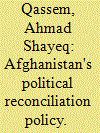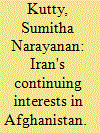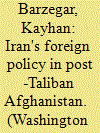| Srl | Item |
| 1 |
ID:
133602


|
|
|
|
|
| Publication |
2014.
|
| Summary/Abstract |
The Afghan government's peace and reconciliation overtures to the militants, initially at the unofficial level but later sanctioned officially, have formed a key theme of state security policy from the early days of the post-Taliban administration in Afghanistan. Yet far from producing peace and stability, they seem to have played into the hands of the violent groups intent on overthrowing the country's internationally supported and legitimate political system in the past decade. There is no doubt about the importance of national reconciliation as a wider process of overcoming the legacy of beleaguered social relationships and forging a common vision for the future among all Afghans, but the nature of the government's reconciliation policy, which borders on appeasement of the militants, seems so far to have created more vulnerabilities than strengths in the face of increasingly emboldened anti-state violent groups.
|
|
|
|
|
|
|
|
|
|
|
|
|
|
|
|
| 2 |
ID:
133166


|
|
|
|
|
| Publication |
2014.
|
| Summary/Abstract |
As the year 2014 rolls on and the United States nears completion of its military drawdown in Afghanistan, its neighbors have no choice but to adjust to the quickly changing landscape. One of Afghanistan's most important-but largely understudied-neighbors is Iran. In the years that have passed since 9/11, it is often forgotten that Iran was an early supporter of the ensuing October 2001 invasion of Afghanistan. Tehran had long been wary of the Taliban and the raft of Sunni Islamist extremists it had aided and abetted. Tehran played an extremely constructive role during the Bonn Process, which produced Afghanistan's constitution including the emphasis upon democracy and support for the military invasion, Operation Enduring Freedom.
|
|
|
|
|
|
|
|
|
|
|
|
|
|
|
|
| 3 |
ID:
133165


|
|
|
|
|
| Publication |
2014.
|
| Summary/Abstract |
Since the collapse of the Taliban regime in 2001, Iran has followed a two-pronged policy in Afghanistan: first, preserve stability and support the Afghan central government, and second, oppose the presence of foreign forces in the country. For Iran, Afghanistan is the focus point of its "Look to the East" grand strategy-which primarily seeks increased energy and economic relations between Iran and eastern countries in the Asia region, especially India, China, and Japan,1 and is the axis of its goal to establish stability in Southern and Central Asia. That is why, for the past 13 years, Iran has supported so many state-building efforts in post-Taliban Afghanistan.
|
|
|
|
|
|
|
|
|
|
|
|
|
|
|
|